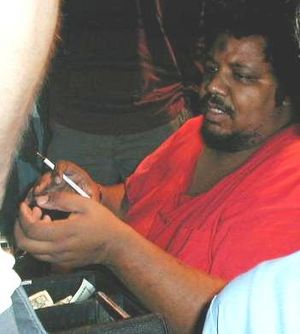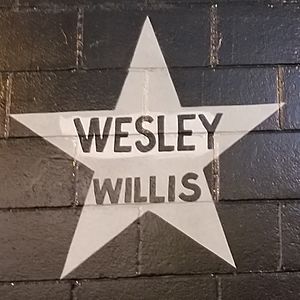Wesley Willis facts for kids
Quick facts for kids
Wesley Willis
|
|
|---|---|

Willis in October 2000
|
|
| Background information | |
| Birth name | Wesley Lawrence Willis |
| Born | May 31, 1963 Chicago, Illinois, U.S. |
| Died | August 21, 2003 (aged 40) Skokie, Illinois, U.S. |
| Genres |
|
| Instruments |
|
| Years active |
|
| Labels |
|
| Associated acts |
|
Wesley Lawrence Willis (May 31, 1963 – August 21, 2003) was a unique American musician and artist. He was known for his special style of music and his detailed drawings.
Wesley was diagnosed with schizophrenia in 1989. This is a brain condition that can make people hear voices or see things that are not real. After his diagnosis, Wesley started his music career. He became known for his "outsider music," which means music made by artists who are not part of the mainstream music world.
His songs often had parts where he spoke like a rapper and parts where he sang. His singing voice was often described as nasal and a bit out of tune, like some punk rock singers. He used a special keyboard that could play background music automatically. His lyrics were often funny, strange, and sometimes a little wild. He sang about many things, including his experiences with his mental health and everyday life.
Wesley Willis became very popular in the 1990s, gaining a large group of dedicated fans. This happened especially after his album Greatest Hits came out in 1995. Besides his solo music, he also had a punk rock band called The Wesley Willis Fiasco. Before he even started making music, Wesley was an artist. He created hundreds of detailed drawings using colored ink pens. These drawings often showed scenes from the streets of Chicago, where he lived. He would often sell his drawings to people on the street.
Contents
Wesley Willis: Life and Art Journey
Wesley Willis was born in Chicago, Illinois, on May 31, 1963. He grew up in public housing with his nine brothers and sisters. His parents separated when he was young, and he spent time in different foster homes. His older brothers helped raise him.
In the 1980s, Wesley started hearing voices. By the end of the 1980s, doctors diagnosed him with paranoid schizophrenia. He spent two months in a hospital after his diagnosis.
Early Art and Recognition
Wesley loved art from a young age. In 1988, a documentary called Wesley Willis: Artist of the Streets was made about him. It showed him walking around Chicago, drawing with his ink pens, and talking to people who were curious about his art.
His drawings were very detailed. They showed Chicago streets, buildings, cars, and famous places. What was amazing was that Wesley could draw a place from memory, even if he wasn't sitting there. He often gave his drawings to friends or sold them for a small amount of money in Chicago parks. After he passed away, his artwork became more recognized in the art world. His art was even shown in a museum in Egypt and had a special exhibit at Dominican University.
Music Career and Fame
In 1991, Wesley became friends with musicians from Chicago's alternative rock scene. After recording some solo albums, he started his punk rock band, The Wesley Willis Fiasco. The band quickly gained a following and caught the attention of famous musicians like Eddie Vedder and Henry Rollins.
In 1995, a major record label, American Recordings, signed Wesley as a solo artist. The Wesley Willis Fiasco band then broke up in 1996. Wesley went on to record many more solo albums. He toured often and was even featured on MTV. He also appeared on The Howard Stern Show in 1996. During his many live shows, Wesley became known for greeting fans with a gentle headbutt. This left him with a small, permanent bruise on his forehead.
Wesley Willis: Passing Away
Wesley Willis passed away on August 21, 2003. He died because of problems from a type of blood cancer called chronic myelogenous leukemia. He was in Skokie, Illinois, at the time.
Wesley Willis: Lasting Impact
Wesley Willis's unique style and personality left a lasting mark.
In 2013, a new character named Milan was added to the Wonder Woman comic books. This character, a blind demigod, was inspired by Wesley Willis's look and actions.
Wesley has also been honored with a star on the outside wall of the Minneapolis nightclub First Avenue. This star recognizes performers who have sold out shows or made a big impact on the club's culture. Getting a star there is considered a very special honor for an artist in Minneapolis.
The American indie rock band The Mountain Goats mentioned Wesley in their 2020 song "Get Famous." The song includes the line, "Wesley Willis taught me how to write about you." This shows how Wesley's direct and honest way of writing songs inspired other artists.
Wesley Willis: Song Style and Topics
Wesley used the word "Hellride" to describe his difficult experiences with what he called "demons." These were delusions caused by his schizophrenia. He said these "Hellrides" often happened on the Chicago bus lines. According to Wesley, his "demons" tried to stop him from making his "Harmony Joy Music."
The songs Wesley made with his band, The Wesley Willis Fiasco, were punk rock songs. They even covered a few songs by other bands, like "Jailbreak" by Thin Lizzy.
Many people noticed that even though Wesley made a lot of songs, they often had a similar simple structure and melody. He would sing about different topics, but his musical style remained consistent.
Wesley Willis: Music Albums
Only a few of Wesley's records are available for download or streaming today. These include Greatest Hits (Volumes 1-3), Rock 'n' Roll Will Never Die, and Rock Power.
- 1994 Radiohead
- 1994 Double Door
- 1994 Machine Gun Kelly
- 1994 Mr. Magoo Goes to Jail
- 1994 Prisonshake
- 1994 Rev Norb #1
- 1994 Reverent Norb No. 2
- 1995 Atomic Records
- 1995 Delilah's
- 1995 Drag Disharmony Hellride
- 1995 Fireman Rick
- 1995 Greatest Hits
- 1995 Jason Rau
- 1995 Rock Power
- 1995 Tammy Smith
- 1995 Never Love A Fish
- 1995 Dr. Wax
- 1995 Wesley Willis (Fuse Records)
- 1995 Daren Hacker (Wesley Willis Records)
- 1995 Wesley Willis (Alternative Tentacles)
- 1996 Spookydisharmoniousconflicthellride (with the Wesley Willis Fiasco) (Urban Legends Records)
- 1996 Mr. Magoo Goes to Jail Vol. 1
- 1996 Mr. Magoo Goes to Jail Vol. 2
- 1996 Mr. Magoo Goes to Jail Vol. 3
- 1996 New York New York
- 1996 Fabian Road Warrior (American Recordings)
- 1996 Feel the Power (American Recordings)
- 1996 Rock 'n' Roll Will Never Die (Oglio Records)
- 1996 Black Light Diner
- 1997 Metal Clink Punishment Jail
- 1998 Rock 'N' Roll Jackflash
- 1998 SMD Promotions
- 1999 Dead End Street
- 1999 Greatest Hits Vol. 2 (Alternative Tentacles)
- 1999 Silver Fish Sea World
- 2000 Guitar Rock of Ages
- 2000 Shake Your Piggy Bank (Coldfront Records)
- 2000 Joe Hunter (Wesley Willis Records)
- 2000 Joe Hunter #2
- 2000 Never Kill an Ape (Wesley Willis Records)
- 2000 Rush Hour (Alternative Tentacles)
- 2001 ASCAP
- 2001 Fool's Gold
- 2001 Torture Demon Hellride
- 2001 Full Heavy Metal Jacket
- 2001 Live EP (with the Wesley Willis Fiasco) (Cornerstone R.A.S.)
- 2001 North Carolina Highway Patrol (Wesley Willis Records)
- 2003 Greatest Hits Vol. 3 (Alternative Tentacles)
 | Precious Adams |
 | Lauren Anderson |
 | Janet Collins |


